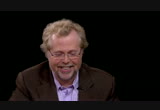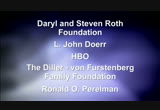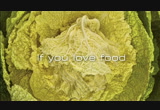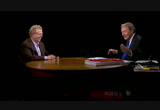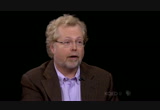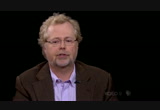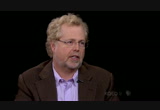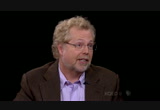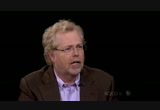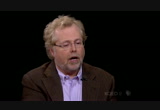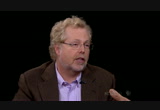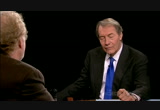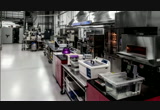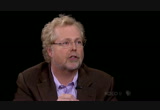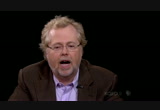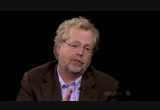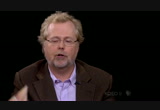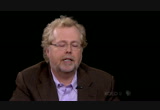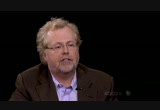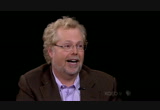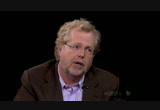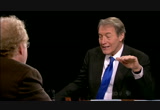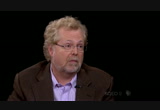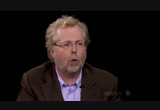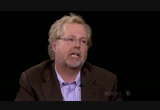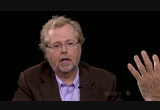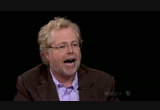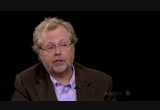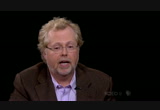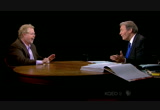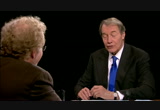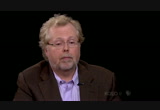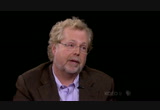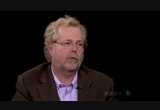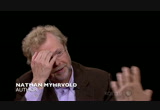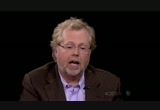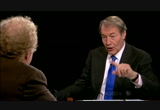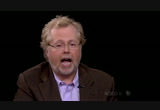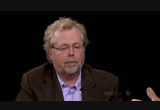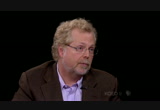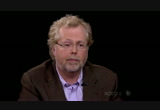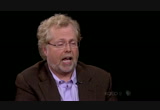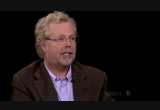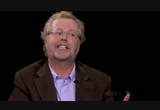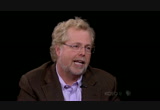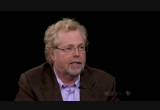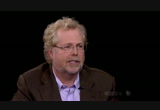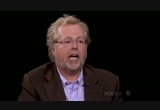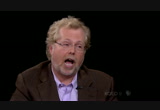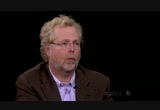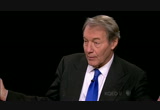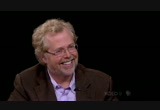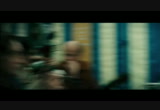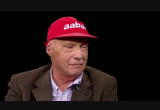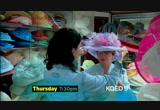tv Charlie Rose PBS November 29, 2013 12:00pm-1:01pm PST
12:00 pm
>> rose: welcome to the program happy thanksgiving. tonight nathan myhrvold his new book is called "the photography of modernist cuisine." >> we wanted to show people a vision of food they hadn't seen before. we all see food a couple times a day because we starve otherwise. but usually you wind up looking at in the a perfunctory way. you don't see it the way that you do if you focus on it intently. so the photo wes take try to show you a view you haven't seen before. so we have things like the cover photo of a tomato that focuses on the thome know a way that's quite different. >> rose: there you go. what are we going to do about microsoft? >> i worked at microsoft for 14 years. >> rose: you sold them your company and went to work for them. >> yup. i was chief technology officer there. i worked very closely with bill and steve and others.
12:01 pm
and it will always have a part of my heart. and it's still an incredibly strong, strong company. it was some great internal values. but i think it's lost its way in a few dimensions. >> rose: well, you should know why. >> it's hard to know why. i think it's a better try say how. one is there's so many different agendas it's working on. >> rose: nathan myhrvold for the hour. next. captioning sponsored by
12:02 pm
rose communications from our studios in new york city, this is charlie rose. >> rose: nathan myhrvold is here. he is the c.e.o. and co-founder of intellectual ventures. for many years he was the chief technology officer at microsoft. he was known as one of the most visionary technology and business leaders anywhere. he is also a culinary pioneer. his newest project is "modernist cuisine" in which he explores the science of cooking. he recently published his third book on the subject. it is called "the photography of modernist cuisine!" it's a visual window into his experiments with food and science and preparation. here is a look at the project.
12:03 pm
>> rose: "forbes" magazines calls nathan's trilogy "the decade's most influential work about food." i am pleased to have him back at this table. welcome. >> thank you charlie. >> rose: i want to be you that's what i want. >> (laughs) >> rose: i mean it's just food photography. >> that would really be slumming! >> rose: food photography fishing, exploration. i mean is there anything
12:04 pm
missing from your life? >> (laughs) i'm pretty busy so it's not clear i need to add anything else. >> rose: how do you divide it up? what's the secret to busy? >> well someone i've got great people around me that helped with these projects. i never could have written these cook books without a fantastic team of chefs and editors art directors people that really help us make the book. it's a team effort. my company where we invent new technology and develop new ideas we also have a great team. so that helps me fill in the places both when i'm absent doing something else but also just makes for a better product. >> rose: it's always the human resources that make the difference isn't it? >> great people are what are behind all creativity all innovation regardless of whether it's culinary or aesthetic or scientific. >> so we'll come to intellectual ventures and all the other things you've been doing but tell me about "the photography
12:05 pm
of modernist cuisine." >> one of my long-term interests is food but the other is photography. i got a camera when i was a kid and i obsessed over taking pictures. sy later got a big view camera and built a dark room at home. i was completely into it. with these projects i was able to combine my love of food and my love of photography. >> rose: what goal yes exactly. >> so we wanted to show people a vision of food that they haven't seen before. we all see food a couple times a day, right? because we starve otherwise. but usually you wind up looking at it in a perfunctory way. you don't see it the way you do if you focus on it intently. so the photos we take try to show you a view you haven't seen before. so we have things like the cover photo of a tomato that's -- focuses tonto may toe in a way that's quite different and unusual. >> rose: there you go. >> it's about a tomato -- it's
12:06 pm
really about the leaves and the stem of the tomato even more than being about the tomato. >> rose: it dominates. it's like the red is background for the green. >> we have photos where we cut cooking pots and pans in half and cooked in them cut in half so we could show pictures of how cooking actually works and give you the magic view that's inside your food. >> rose: how does cooking actually work? >> well it depends it's complicated. cooking is the only science experiment we do on a regular basis. and a simple act of cooking a male involves lots of interesting chemistry and physics,er thermo dynamics. >> rose: do most great chefs know science of cooking? >> no. most great chefs have an intuitive knowledge of it but not a scientific people e -- knowledge of it. >> rose: to what use it is for them? >> if you want to do something new. you know, if you follow a recipe
12:07 pm
you can follow that recipe and you don't need to know how it works but you no if i do step a b and c you'll get the result. but if you want to make up your own recipe and do something new and different that goes in a radical new direction then understanding how things works really help. >> rose: what goes together what doesn't go and what might lead to something unpredictable. >> that's right. >> rose: so what kind of camera do you use? >> mostly i use cannon digital cameras. all manner of them. and tons of different lenses and microscopes and equipment. >> rose: this is also an experiment in publishing you say? >> well when we first made our cook books, the first version was six volumes 2,438 pages. >> rose: i remember. >> no sane man would publish that so i published it myself. (laughs) >> rose: (laughs) which makes you insane. >> well pretty much. with a pre-existing condition is
12:08 pm
what they say on the insurance form. so we've built a publishing company around these unusual books. they're more in-depth bigger more expensive. they deliver more value than traditional publishing is used to. >> rose: different value is what? >> well, for example a lot of cook books in particular are about dumbing things down for people. i totally understand that. but i think there's people in are intellectually curious. so we wrote about a book that was about intellectual curiosity. even if you don't how this stuff works up front. even if you have no intention of cooking this way we'll tell you how it works. most photo books, for example don't tell you how the photography is done. we have a 38-page section in the back where we show how we took all the shots because i think that's kind of cool. >> rose: oh i do too. people always find process interesting. you know sometimes it's not
12:09 pm
attractive as they say. sausage and politics making laws and making sausage you don't want to watch the politics. but other people are intrigued by how grow from here to here and what happens in between. i want to talk about the modernist approach here which you say is a new aesthetic that embraces abstraction modern technology science-inspired ideas to create genuinely new experiences. just elaborate on that. >> well we all love variety in food. there's more food available in new york more different types of food now than ever before in history. 30 years ago sushi was rare in new york. sushi is everywhere. just a few year ago korean fried chicken wasn't that common in new york now there's tons of places that go do it. and food trucks. we love variety. and one way to get variety is to import something from another culture. sushi is a good example of that. another way to get variety is to invent brand new things. and, of course, every great
12:10 pm
dish-- pizza, ice cream ham bergers-- they were all invented at some point in time. there's a set of chefs that have dedicated themselves to inventing and reinventing cuisine because by giving something that's really new and unfamiliar it provokes an interesting experience. >> rose: and who are they? >> oh, in spain feran add devil ray. the rocca brothers. in england heston blumenthal. in the u.s. grant -- >> rose: these are people who have great restaurants like heston blumenthal and adrian did before he went away to study or teach or whatever he's doing. >> well he's going to reopen it as a culinary foundation where they do research in food without serving food to paying customers. which i say that's kind of what
12:11 pm
have my lab has been doing for the last five years. so in terms of guys that write cook books and do research in food without serving food i'm kind of one of those too. >> rose: yeah but do you like food because you love to eat or do you like food because it's just an interesting thing for you that you can go off and explore? >> well it's both those and one other. and so, of course i love to eat. and without a passion for eating and a passion for food you can't go very far in being a chef. you have to appreciate the subtle nuances. >> rose: do you believe that's true that most good chefs are also great eaters. >> they have to be great tasters. >> rose: they have to taste yes. >> if you don't have a great sense of taste -- it would be like being a great composer that was tone deaf. >> rose: that's interesting. >> or a great painter of color and things that was color-blind. i mean it really is hard if you can't have the taste. and of course it's interesting intransally, that was the second thing you mentioned as just a
12:12 pm
point of curiosity how do these things work. and the third cooking is about sharing. you cook that so that yourself and others eat. and chefs get a tremendous pleasure out of seeing other people eat their food. in my case it's not so often that people eat the food, although sometimes we cook for folks. they consume our stuff by looking at the book by looking at various other things that we do. our web site and so forth. >> rose: all right let me talk about some of the images that we have so we can get some sense as we show people at home what we're talking about. image number one is the modernist kitchen. this is your lab, what you built i guess at intellectual ventures. there it is. what are we seeing? >> so we were building a lab about six years ago to do machine shop work all kinds of prototyping of new inventions and we had some extra space, i was just starting the cook book project so we built this culinary lab which features all of the equipment of a great
12:13 pm
restaurant kitchen and a lot of the equipment of a chemistry or biology lab all put together. >> rose: okay. the next slide is a salad cutaway. this is the cross section we talked about earlier of a salad bowl. there it is. >> so here we have two things going on. we're showing you a salad, we're also trying to show you the ingredients. once it's all crunched down in the salad it's hard to see but if you explode it up you get to see the individual pieces. it's inspired actually by something called an exploded diagram. when i was a kid i would work on cars and those chilton manuals for taking the engine apart would always show the engine and the screws are all coming up. that's all taken apart in this magic exploded view so this is the magic exploded view of a salad. >> rose: the next someone of a pressure cooker cut away. oh, look at that! >> so in these pictures we are trying to describe how cooking works and the best try do that i found is visually. so this shows food that's pressure cooking and then we
12:14 pm
annotate it with lots of little notes describing how things work. >> rose: i mean i'm so ignorant of all this. is there a lot of use of pressure cookers in cooking? >> yes. >> rose: it's a big snool >> yes, it's a big tool. now it was bigger in your grandma's age perhaps than it is now. >> rose: because we have other things that achieve the same result? >> well it's just gotten less popular. but we believe enormously in pressure cookers. there's a amazing things you can't do anywhere else. >> rose: like what? >> we make a wonderful caramelized carrot soup. there's pictures of that in there. it turns out that normally water boils at sea level at 212 fahrenheit, 100 degrees celsius. if you put in the a pressure cooker you can get it much hotter 250 fahrenheit 121 celsius before it boils because the pressure keeps the water from boiling even at a higher temperature. and means you can cook food at higher temperatures and it makes
12:15 pm
carrots caramelized tenderizes tough meat. so this was originally for our big chapter on vegetables and we wanted to show vegetables the way they are in nature and we're used to seeing them -- >> rose: my first impression is how colorful they are. >> well, of course we picked the good-looking ones. (laughs) >> rose: we don't want ugly vegetables do we. we don't want brown vegetables we want green red vegetables. >> vegetables are something that comes of the earth. there's a great vegetarian restaurant in new york called dirt candy." and this sort of expresses a similar idea that you've got some amazing things that grow in the dirt but they are sort of this amazing part of nature. >> rose: have you ever considered becoming a vegetarian or a vegan? >> um no. >> rose: (laughs) >> i love vegetables i love fruit and vegetables. >> rose: but those are the things you don't want to give up. >> not on a permanent basis.
12:16 pm
a vegetarian meal i love because it gives you a different way of experiencing a male. >> rose: exactly right. and it shows you what you can be done and find a perfectly wonderful meal that's all vegetables and how creative people can be with vegetables too. >> and when it's done right you don't hardly notice there's no meat. off fantastic fulfilling experience and say "i guess there's no meat there." but i wouldn't want to swear off meat forever. >> rose: this is the cross section of a blender. >> and there's me taking the picture. >> rose:. >> rose: exactly right. >> so we have a section of how we did the photo. we literally take a blender and cut in the half in our machine shop. then i arranged these tomatos in the blender. we were making tomato sauce. i used sewing needles to carefully stick the tomatos to each other in an unobtrusive way so they would all in the there.
12:17 pm
twice they all fell slumping down. it was a disaster. which is one of the lessons of cutaway photography. you make a hell of a mess. >> rose: really. because it doesn't mold? >> it only has to look good for a thousandth of a second. as soon as the picture is taken we don't care if it goes to hell so that was a kind of funny shot that shows what it's like to shoot half a blender. >> rose: the next someone a blueberry cut open. >> yeah. >> rose: there you go. >> so everybody's seen blueberries but nobody's looked this close at blueberries and in fact a lot of people when they see this picture at first they don't know what it is. >> rose: i know i didn't. >> and blueberries have orange seeds-- who knew. if. >> rose: who knew. >> they also have these wonderful dusty powdery kind of texture on the outside of the blueberry. this is a way of showing you a blueberry-- which is totally familiar-- but in an unfamiliar way. brown brown the next one is a mussel trapped inside balls of mussel juice. the technique is called spearfycation.
12:18 pm
>> yes this is a dish that was invented by ferran andrea. >> rose: the great ferran andrea. >> i love it because it kind of looks klingon food star from "star trek." it's weirdly alien. putting mussels inside a spherical capsule of their own juice-- which is delicious by the way-- also just looks so unusual that it's now challenging your idea of what food is. nobody looks at this as oh yeah like mama used to make. >> rose: yeah, they don't say that do they? what's the contribution of ferran andrea? >> well i think he had an amazing contribution to 21st century -- >> rose: pioneering molecular cooking? >> pioneering his own style. ferran in 198 3coms to work as
12:19 pm
like a busboy in the restaurant of a miniature golf course. it was a seaside bar and grill of a minor miniature golf course. this is not a very propitious start to change the world. but over a period of time he taught himself and then kept innovating and innovating. originally wanting to emulate the great masters in france he emulates them and then he just blows right past creating his own dynamic unusual cuisine. >> rose: blows right past. and how do you define cuisine? >> well i call it modernist. that's my term for the entire thing. there's a critic in spain that calls it technoemotional. it's the middle east intellectual view of cuisine you'll probably have. >> rose: so he was blowing past chefs he admired in france in your opinion cambridge studying
12:20 pm
with stephen hawking. >> that's right. that's right. and i heard about him cooking in the late '80s again in the '90s and it took me a while to go down there and see what was up and i was amazed when i first did. >> rose: why did it take you a while? too busy in >> yeah too busy. >> rose: next slide is a bullet passing through a dozen eggs. >> (laughs) >> so we got an ultra high speed camera and we started using it to like film popcorn being made. that's an awesome thing. then we thought well, you know, there's an old expression if you want to make an omelet you have to break a few eggs. and someone in the lab says "you know, my cousin's got a rifle." >> rose: (laughs) what caught the bullet at the other end? >> a big backstop. it was a shooting range. >> rose: oh i see. >> we went out to a shooting range and -- there's no culinary purpose to it but my god it was
12:21 pm
found do. >> rose: all right the next thing we're going to see quickly is a global good vaccine canister. >> so now we're switching gears to some of the projects that we do in the lab other than cooking. in the developing world we all get our vaccine shot, we don't think about how the vaccine got to the the doctor's office it's not a big problem because we've got a good power grid. in africa a huge percentage of the vaccines spoil between being ship from the manufacturer and getting out tow the child's arm. that will cost money but ultimately that kills children. because kids will get diseases sometimes fatal diseases while waiting far vaccine to come out. well, a lot of people have come up with solutions to this. ours is this vaccine contain cher can hold vaccine cold literally for months at a time with no power whatsoever. it's a really really good insulated box. >> rose: bill gates is involved in this idea too. >> bill is our biggest supporter in a project called "our global
12:22 pm
good" fund where we try to come up with clever technology solutions that are appropriate for the developing world. you know the silicon valley has been about building tools or toys for rich people and by rich people i don't mean rich in this country. everyone. in this country rich on a global scale. and regardless of whether it's a cell phone ar a computer it's a tool or a toy. they've transformed our lives but we didn't need our lives transformed. we're not on death's door. the people who didn't need transformation are those living on a dollar or two a day. >> rose: my question is the potential of silicon valley to affect global change is it operating at 10%? >> well -- >> rose: is the whole idea of the richness of america's human
12:23 pm
resource and innovation to make a difference around the world in a very positive way and i've had and you might have heard the people -- bill gates for example say america needs to do a whole lot of other things which is an exercise of itself. >> uh-huh. well silicon valley has affected the world very much in one category of things. so if it's about the distribution of information-- the internet search engines social media companies like facebook twitter google microsoft, apple huge impact. when it comes to affecting the lives of people who live on $2 a day or less-- which by most estimates is a couple billion people-- silicon valley doesn't focus on that problem at all basically. >> rose: should they? >> i think that you can take silicon valley style brain power and you can apply it to those problems and you can do it very
12:24 pm
usefully. so we've got a bunch of projects to do that. i'm in the minority on this. not everyone agrees. >> rose: what is their difference? >> well some people say look, what i know how to do is this information technology thing so i should do that hand it will trickle down. and there is a trickle-down there's certainly a trickle-down effect within the developed world and maybe ultimately -- >> rose: do you think they're conning themselves when they say that? that they just don't want to do it? >> i'm not sure they know how to do it. >> rose: okay. >> because coming up with a new kind of app doesn't help people living on $2 a day. you have to focus on the problems that are really relevant to them. >> rose: but this is not an either/or proposition is it? >> no but you asked what is their impact. their impact is very high for one category. collectively the world's impact on the very poorest people has been minimal. that's why they're poor. the reason there's people still living on $2 a day is because the rest of the planet has not positively influenced them hardly at all. they've been stuck in basically
12:25 pm
the same situation since the 19th censurefully many cases. >> rose: right. >> so the challenge is can we -- >> rose: wait until they meet pope francis. >> (laughs) he's certainly shaking things up. >> rose: he certainly is. but with a real sense of mission about the pastoral role and the responsibility of the church. i mean i'd love to see that mixed with the brain power of silicon valley just to take one example. or around the world whether it's cambridge or somewhere in moscow or wherever it might be. >> rose: on spiritual or pastoral matters you're much better with him than me. it's not my thing. but we do try -- >> rose: that's what he said about science. he said "talk to nathan about science." >> we really think there's a role for smart people in the technology world to help the -- >> rose: but why don't we have a catalyst? you have people like bill like you, but it does need somebody
12:26 pm
to say i'm going to organize this. i'm going to be the mover and shaker of this. and maybe it ought to be the bully pulpit of the presidency but somebody ought to do it. do you agree? >> i aagree. >> rose: okay we'll put that on our agenda. >> careful charlie it might be you! (laughs) >> rose: i just bring them here to the table. so let's talk about a couple things in terms of polio eradication first bill's great cause and something you believe in is a worthy objective too and an achievable objective i think. >> it's going to be challenging but i think it's achievable. >> rose: but i wasn't so challenging a year ago because i talked to bill and he was much more optimistic. i haven't talked to him recently about this but he was optimistic then. he h he thought five years then and you're saying now we've had impediments in the road? >> there are always going to be new impediments. >> rose: but are there impediments we didn't foresee? >> syria has a polio epidemic and it's frequently the case
12:27 pm
that you have political problems make the health problems worse. >> rose: right. >> so here you have a place which is a terrible place for health workers to go do vaccinations because there's an ongoing civil war and you've got refugees you've got bad sanitation, you have all of the pre-conditions for there to be an outbreak and sure enough we got an outbreak. >> rose: and you also have circumstances in some places where they don't look too favorably on polio vaccine workers and people trying to -- and they shoot them. >> so it turns out if you try to eliminate a disease like polio your hardest places are going to be the worst places on earth in multiple categories. they have governance issues they have safety issues, they have hygiene issue. we have a unit called the institute for disease modeling that is working very intensively on trying to model "what if" scenarios to try to guide well, what if this happens how do we respond we radcation? >> rose: malaria, where are we with maly ya? >> malaria is another very hard
12:28 pm
problem. malaria is a disease that has been with man for a long time. it used to be a scourge in europe. people don't think about this but malaria is an italian word! and something like 14 or 15 popes died of malaria rome used to have a terrible malaria problem. >> rose: what happened? used to be you said. >> they wised up in a variety of different ways including draining swamps and public health measures. it turns out you can beat malaria if you have a high enough per capita income. so roughly $2,500 a year per person, count wrez with that level of income don't have malaria problems. >> rose: most developed nations do not have a malaria problem. >> correct. in the 19th century malaria went as high as the arctic circle. all of europe had it. in 1935 there was 150,000 cases in the united states.
12:29 pm
but we cleaned our act up. the poor world has a difficulty doing it which is why we're trying to come up with other interventions but it's a very challenging disease and there's a big effort on a malaria vaccine called r.t.s.s. unfortunately the latest results coming back look disappointing and without a vaccine it's hard to know how you can intervene effectively. you can do bed nets up to a point but to eradicate malaria we need to have new tools in the tool box. >> rose: so what are we going to do about microsoft? >> i worked for microsoft for 14 years. >> rose: you sold them your company and work to work for them. >> i worked very closely with bill and steve and others and it will always have a part of my heart and it's still an incredibly strong strong company. with some great internal values.
12:30 pm
but i think it's lost its way in a few dimensions. >> rose: well, you should know why. >> it's hard to know why. i think it's a better try say how. someone there's so many different agendas it's working on. microsoft spans back office software and office productivity thing microsoft office. it has this huge operating system business in windows. but it's also trying to do xbox which it's been quite successful with. it's doing smart phones which has been much more of a challenge. it's -- competing with search engines. there's a lot going on. >> rose: but google is doing a whole lot of things too they don't seem to have the same kind of problems. >> well i think people in microsoft still know how to develop software. >> rose: that's the point. that's what they really know how to do and -- here's the argument that i think might have been made by -- made by others for
12:31 pm
sure. they said that microsoft has not had the ability to look at things with fresh eyes. and one of the things that steve jobs had, he could look at things we a beginner's eyes with fresh eyes and-the-wasn't therefore trying to say because we have this we have to fix and modify and change this. he'd say let's look at this from ab initio. >> the trouble with a steve jobs based argument is he was such a unique talent. >> rose: fair enough. >> i was sitting beside bill once at a presentation that steve was making at an industry conference and bill leaned over to me and said "god, if they had a company with a sales force composed of guys like this we'd have to surrender." i leaned over and said "don't worry bill there's only one." >> rose: i watched a steve jobs presentation, too. and it's -- it's more than he was a salesman. it's more than he was a -- >> he was a unique talent. >> rose: he was a perfectionist. >> absolutely.
12:32 pm
>> rose: and he was constantly asking questions. that is really serious question. you know better than most. what has been missing at microsoft? and, two would it have been missed if bill was there? >> well those are imponderables. it's -- i think that the set of tasks that microsoft has engaged in the company has been so large that they've -- it's been hard for them to be as consistently innovative. the other thing is frankly the things that they do well have been maturing. >> rose: that's true. that's very true. >> the for instance between google and microsoft is largely that search and android phones are on the up swing where being the best company in the growing market is great. microsoft's core markets have been mature. they haven't been growing that fast. >> rose: there's also this: sometimes timing is important.
12:33 pm
at microsoft they were looking at tablets and voice recognition and a whole range of things. >> before any of these guys. >> rose: before anybody. before anybody. $and apple was looking at smart phones before they were phones. it was called apple newton and it was a terrific thing for them to try but it was an abysmal failure. most overnight successes come after repeated tries and failures. >> rose: that's what science and a lot of things are about. >> you have to keep at it. so microsoft was a tablet computing pen computing company before many of these guys were out of high school, to be blunt. but those efforts of microsoft's were premature. and then when it came to the era the other guys got a jump ahead. and technology is the thing where if you come in early and have a great product offering you can distance yourself. it's very hard for others to catch up at that point. >> rose: jeff bezos told me
12:34 pm
recently look as big and as exciting as amazon is somebody will come along a disruptive technology that will wreak havoc with us at some point. and you haven't had that so much at microsoft. but the interesting thing about -- you've had billions of dollars in the bank. >> i think they still do. (laughs) >> rose: they do! maybe there's the problem right there. they didn't spend that money well on buying things. they tried to buy for god's sakes, yahoo! they could have bought facebook. if they could have bought a piece of facebook. >> fascinating question. >> rose: i know i know. >> and it's not clear that would have been smart. facebook grew and prospers under mark because mark was the driving passion and if you'd taken him out of that role and put a bunch of guys at microsoft that experienced in other areas to micromanage him it's not going to -- it wouldn't have worked.
12:35 pm
a dilemma for many tech companies is they have tons of cash but don't have a great use for their cash because if you just hire more people that doesn't help. >> rose: apple is a perfect example, too. they're sitting on tons of cash too. >> and google. all of the great companies will develop more cash than they have a strategic use forand acquisitions only take you so far because you have to manage them and integrate them or you let them run amok and no one's come up with a good way to do that. >> rose: it's not easy. >> it's true. >> rose: so you have a lot of respect and he was a friend of yours steve ballmer. >> absolutely. >> rose: at some point the board said "we need to look at a new direction." correct so far? >> well steve announced he's going to step down and i'm not privy to all of the details behind this. >> rose: i don't want you to sit here and criticize your friends but i want you to know what you think microsoft needs. give me a profile of a c.e.o. that you think would be appropriate for movt at this moment? >> okay the problem with this
12:36 pm
charlie, is this is like trying to come up with a perfect dish. go back to cooking. it should taste like chocolate feel like love and cure cancer. that's be great! only we can't get all those at once. >> rose: right. >> and at a point that i used to make to bill when i was at microsoft and have made it to him since then is even if you had another bill gates, bill gates at an earlier point in his career didn't have all the experience of bill gates later. and suddenly parachuting the young bill gates into microsoft may or may not be a good thing. because most great tech entrepreneurs, particularly the people in have gone on to lead their company for a long period of time like jeff bezos like mark zuckerberg like larry page those people i think, would be the first to say oh my god did i ever learn on the job. >> rose: meaning they did very much learn on the job. >> absolutely! so i think on one hand for
12:37 pm
microsoft i'm a technical guy and i feel the center of any tech company is product expertise. i want to say someone who's deeply immersed in product who is a technologist at some level. not a person writing code. i say "you're going to want that." then you say you have this giant work force of people, so you want someone who's a great people manager. but then you say and each of these divisions and these businesses are so huge you want someone who's more of a financial style leader. so if you could take bill gates and jack welch and warren buffett and you could all do the mashup. >> rose: blend them together. >> it would be great! but the world's never had something like that. >> and the longer you wait to make a decision like that the more difficult it gets. >> i think microsoft has the problem that a lot of people think that they're at death's door when in fact they're very
12:38 pm
strong. >> light. they're not going broke tomorrow. >> no way! they're an incredibly strong company. but there's a popular perception that they're adrift and the longer you let that perception go out there the more scrutiny there is on what your next choice is. now that they're going choose a knew c.e.o.-- and they've got a year to do it because steve has announce head beal there for a year-- but the scrutiny on the board has got to be amazing because people are going to be second guessing third guessing fourth guessing almost any choice they make. and so i don't envy them in having to do this. i'm very optimistic they're going to come up with a great leader for the company. >> rose: give me your definition of who bill gates is through your eyes. through your eyes. >> well bill is one of my closest friends and he has been historically one of my best supporters.
12:39 pm
i was a nerdy guy who in most companies, i don't think, would have risen or been backed anything like bill backed me. one of my favorite pieces of e-mail he ever sent me was i proposed this crazy project and he sent back a two-line piece of e-mail. usually he'd send longer ones. and he said "this has got to be the craziest thing you've ever suggested. please proceed." >> rose: (laughs) love it. >> you have to love that! >> rose: yeah you do. >> and these days the focus isn't on driving microsoft forward it's on trying to beat polio. on trying to beat some of the horrible conditions in third world agriculture. hunger. >> rose: education in america. >> and i can't help with all those but where i can see a way to help his drive and his support and his relentless rationality are all things i
12:40 pm
find very inspiring. >> rose: one of the smarter people you've own? >> (laughs) by a long shot! >> rose: i'm trying to get that in. >> he's brilliant. he's absolutely one of the smartest people i've ever met. i know some insanely smart people are great individual contributors and are age to come up with a fantastic insight on their own. i know a few others who can collaborate with a small group. bill-- both at microsoft and now at his foundation-- has managed to build organizations and inspire those organizations to achieve way more than he could personally. i think that's a really unique thing. it's not just a question of brilliance it's brilliance and being a leader. >> rose: so intellectual ventures. tell me about the patent acquisition game. >> so i have this idea that -- actually a fairly common idea until you apply it to my area and that's if you build a liquid capital market to support an
12:41 pm
asset it's a good thing. and one example of that have is venture capital. and starting 30 40 years ago the first beginnings of venture capitalism industry they have this yay zi idea. let's invest in something that doesn't exist yet. a company that is unborn. it worked out great. more recently private equity was about supplying capital and expertise to a kind of company that wasn't really appropriate for public markets. there is a gap between a public -- a well-run private company and public companies. let's focus there. well i think that's true with inventions. i think there's lot of companies that have inventions they don't know what to do with. there's also lots of inventors that can't get support. so i created a couple of investment funds one that those two inventors before they have ideas-- and we support those inventors in having a new idea-- we have another one that says hey, if you've got inventions you don't know what to do with
12:42 pm
we will partner with you and buy them with you and we'll take them forward. and in each case the existence of this provides capital to folks. between these two programs i've supplied over $500 million to individual inventors. i don't think there's anybody else in history that's given $500 million to individual inventors. now when i say that you might be thinking of the doc in the bank to the future movies and say hey make it wasn't such a smart thing to give $500 million. but a huge amount of ingenuity comes from individuals. they also come from small companies and large companies. and if you can financially motivate those inventions give people a way to achieve some financial liquidity for them i think it's a good thing. but it scares people. >> rose: at side of patents are these big battles that companies have thinking about apple and samsung. >> yup.
12:43 pm
>> rose: so in mature industries patents have been around for a long time. take the drug industry. every drug company relies on patents. >> rose: which last for x number of years. >> and then they're gone. occasionally those drug companies will fight over patents because they think one of the drug infringes another drug. no one in that process ever think it is patent system is broken, they just think it's part of the game. well historically-- back in the gold old days when i was first in the p.c. industry-- no one had patents. microsoft had zero patents. two patent applications but zero patents. the same thing was true for apple or any other company in that era in the mid-1980s. well if you fast forward to today a company like apple has tons of patent it is. and they're kind of tired of seeing somebody else copy them. so they say hey we need to do something. now, samsung for their part either says gee i think it's
12:44 pm
legitimate for us to copy them because they aren't protected or they say, yeah maybe we copied you but maybe you copied us so you get these titanic battles and they're interesting because it's basically like teething pains or adolescent tantrums. it's the industry going through the same growth thing that pharmaceuticals or cars or lots of other industries went through this. they went from an era that was the wild west when they didn't have patents to suddenly they have patents. now, the stakes are huge. apple has a market cap of like $500 billion. everyone thinks that there's a possibility they could go to a trillion dollar market cap. samsung google and others look at that and say "we'd like the next $500 billion to come to us, not you." so you have something worth a trillion dollars. don't you think people are going to try pretty hard? well, of course they are and patents are one of the areas.
12:45 pm
now, if you're a company that historically didn't use patents you say wait a minute! what the hell is this? why are they using patents? that's not fair! well, of course it's fair. it's been the law of the land for 200 years. but it's unfamiliar. because of that it upsets people. particularly those people that think they're on the losing end of it and don't have as many patents. so that's that's caused a huge arms race but mostly between companies that historically haven't had patents because -- often because they're younger with companies that, in fact have been innovating for years and years and years and years. >> rose: you have lots of lawyers. >> well any time you have a $500 billion market cap or you have a trillion dollar jump ball oh, there will be some lawyers charlie. don't worry about that. that's like putting blood in the water and saying "gosh there's sharks coming!" >> rose: where'd they come from?
12:46 pm
(laughs) >> the smart phone business people like to talk about it in emotional terms but the financial reality is it's a trillion dollar -- these are big boys. they're going to compete every way they can. they compete on products they compete on locking up suppliers and they'll compete on intellectual property. to the degree they copy each other legally we benefit from that. to the degree a company makes a unique investment, the law says and i think it's the right policy that they get a unique period of time to exploit it. >> rose: right. now it's very disruptive when you have this kind of a war. in fact, in the 19th century the same thing played out with cattlemen. there was a set of folks who wanted to run their cattle across the land and there were other people that wanted to have barbed wire and it was even a shooting war. billy the kid was a mercenary
12:47 pm
soldier in a war between the guys that want that wanted to put up barbed wire and guys that wanted to have cattle drives. a lot of silicon valley company have been the cattle drive guys they say "we can use whatever idea we want. it's out there. isn't it right and proper for us to do anything we want? these other guys didn't help us. we copied it fair and square." the other people say "no, this is barbed wire. this is our property, we have a deed to this idea. and we see that battle happening. these days instead of hiring billy the kid to shoot up the other guy you hire a bunch of lawyers. >> rose: you hire billy the lawyer. >> billy the lawyer and billy the kid are kindred spirits in that sense. is. >> rose: guns for hire. >> it's not surprising when there's a trillion dollars at stake. >> rose: how will it play itself out? >> well what's happened in almost every other industry is you see that there are fits and starts, there are big-court
12:48 pm
cases. eventually if you -- i look five or ten years down the road i think we'll find all of the major companies having tons of patent it is. i think we'll find patents are a mature part of the smart phone business. by the way they always have been call come is a company founded on great inventions pretexted by patents. so i think we'll find that google and samsung and apple will reach a patent stalemate at some point in the future. there may be some adjustments to the market cap in the meantime. i'm not close enough to the specifics of the trials to bet on who's going to get what exactly when. but there's going to be a lot of people moaning and whining about well, how come there's all these terrible legal battles? it's ineffortable when you have a trillion dollar jump ball. >> rose: so who wins the operating system of -- apple or android?
12:49 pm
>> android and apple are both hugely successful. and of course they are co-cyst. >> one is increasing its market share fast than the other. one seems to have a stronger velocity. >> i think that -- you know apple has a set of technology values around its product that it's been very successful. >> rose: closed systems. >> beautifully designed systems is how they would put it. yes they're closed and being closed gives you an edge at taking some of the burs off. on making stuff work. >> rose: on the other hand people say not being closed gives you the edge in that you can get other people to contribute to your -- >> and they're both right charlie. when i was chief technology officer at microsoft we had the nerdier approach trying to make windows as a nerd di technical product that would address many
12:50 pm
different computers. because we would address 100 manufacturers computers it was good on most of them. it was never as perfect. apple would only address two kinds of computers or four kind of models backing in that era. and because they addressed a much more limited number of hardware things they're fit and finish -- level of perfection was always higher. >> rose: steve jobs said we're going to restrict the number of products we have. that's our first decision right here. >> and by restricting the number of products you can achieve something different. now because i came from the open platform world i have great sympathy for open platforms and the open platform at the moment that is growing is android. but there is something that people love about their iphones and i would not write apple off. and, of course microsoft is out there trying really hard and i have enormous sentimental loyalty to -- in fact i carry a
12:51 pm
windows phone. >> rose: my point is not that one is going to destroy the other it's just the dynamic of change. >> at apple their proposition has been about superior design. whether that's literally an aesthetic design level or at other technical aspects of design the iphone is what it is because it was perceived by many to be best coolest most cutting edge most exciting platform with the most apps, et cetera. that's been their proposition. and most people would say steve jobs had an enormous amount to do with that and we know that he isn't there unfortunately to continue that. so apple's job is to say how do we take that thing forward? android's job is to keep pressing on and supporting an ever-wider of phones and achieve as high a level of fit and
12:52 pm
finish so forth as they can albeit in something that is going out the many many different manufacturers. and both do that in a world where are there's a lot of intellectual property land mines that each of them may be stepping on. and each of them is very active in suing the crap out of anybody who gets in their way. each of these companies will have a posture where they say well, of course dastardly people did terrible things that we have to respond to in our suits. the but the reality is it's big boys fighting for a trillion dollar jump ball. >> rose: and it makes life interesting. the more interesting thing about it is that whatever the population now that has access to the internet it's an extraordinary wide open opportunity when you think of having people on the plane and having people be on the planet and somehow connecting them is a remarkable opportunity with huge
12:53 pm
potential. >> absolutely. when i was at microsoft one of the things that i loved was the further the personal computing got the more potential there seemed to be. >> rose: exactly. >> and the personal computer reached a zenith and then the internet pushed it forward. and the internet is fantastic but having mobile access to it every moment of your day, that's an amazing thing and we're going to continue to find enormous potential. >> rose: thank you. this is nay unanimous's book. it's called the photography of modernist cuisine. there it is. you'll see pictures like you have never seen before and he's enormously proud of that. turn it around this would be, i believe, a strawberry but i'm not sure. >> that's a strawberry. >> on the next charlie rose we talk about formula 1 racing and a new movie called "rush." >> it's technology pushed to its
12:54 pm
limits whereas with nascar they hold it back a little bit. so everything is about being on the limit and the demands on the vehicle and therefore you know the skills of the drivers are different. but for me it was interesting because it's a story of two rivals. it's a story of achievement. kind of an inspiring story in a very unexpected way. in fact as i was saying before we started i think "rush" probably surprises audiences in a positive way not because of the twists and turns in the story-- although there are some-- but no one knows what to expect of the film and the reaction has been as good as any movie that i've had. >> i've never really understood what that means. i love my job. i love competing. i love racing. maybe you should ask nickie he's the world champion he's got everything to lose. >> are you feeling fresh injury? >> do i look like i'm feeling pressure? i'm world champion i'm on the verge to become world champion again.
12:55 pm
it's not a so easy to become a champion. you have to really believe it to make it possible. >> james is there anything you'd like that add. >> if nicky is being tricky and getting a kicky out of playing mind games -- (laughter) -- then fine i'm flattered but momentum is with me. i've never felt better. and i fully expect the next press conference will have me as world champion. >> there are very little friendships between racing drivers because there's only respect or no respect because we fight each other like crazy but in the end that james won in that particular year the championship, i was happy it was him and not somebody else if i couldn't do it. >> but he in fact said i wish we could have shared this and it would have been nice because of the respect he had for you. >> yeah. i had the big accident and lost nearly my life and three races. then he beat me by one buoyant. because at the beginning of the season i was dominating everything winning six races out of eight so everything was going fine and then the accident came and stopped me.
12:56 pm
1:00 pm
128 Views
IN COLLECTIONS
KQED (PBS) Television Archive
Television Archive  Television Archive News Search Service
Television Archive News Search Service 
Uploaded by TV Archive on

 Live Music Archive
Live Music Archive Librivox Free Audio
Librivox Free Audio Metropolitan Museum
Metropolitan Museum Cleveland Museum of Art
Cleveland Museum of Art Internet Arcade
Internet Arcade Console Living Room
Console Living Room Books to Borrow
Books to Borrow Open Library
Open Library TV News
TV News Understanding 9/11
Understanding 9/11
